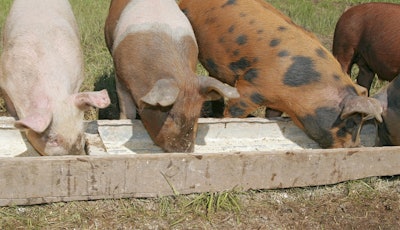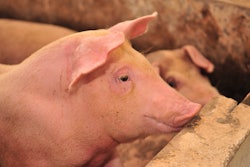
In Hong Kong, a further six outbreaks of African swine fever (ASF) have been confirmed on licensed farms.
These bring to 10 the total number of premises in the territory affected by the virus since October, based on official notifications to the World Organisation for Animal Health (WOAH).
Among the latest premises to be infected is one located in Sheung Shui. It is the first in the current outbreak wave in this district of the New Territories. All other outbreaks have been confined to the Yuen Long district, also in the New Territories.
The latest outbreak was confirmed on January 13. Although information provided to WOAH on the affected herd size is incomplete, the previous nine outbreaks in the Special Administrative Region involved a total of just over 16,000 domestic pigs.
Subsequently, Hong Kong’s agriculture department reported that 1,393 pigs have been culled at the latest premises to be affected.
In order to increase the level of surveillance, the regional government has called for all dead pigs to be tested for ASF. Carcasses can only be disposed of after a negative result.
2 more outbreaks on South Korea’s farms
Last week, presence of the ASF virus was confirmed on two commercial premises in South Korea, reports Pig & People (as of January 20). These bring the nation’s total outbreaks in this population since August 2021 to 40.
As well as breaking through this milestone, the latest outbreaks include the first in this population in the eastern province of North Gyeongsang. It is the nation’s fourth province/city to record ASF cases in domestic pigs. Affected there was a commercial herd of 482 pigs.
South Korea's agriculture ministry reported that two infected wild boar had been found near to the farm in recent weeks, indicating a possible route of infection.
Two days later, presence of the ASF virus was confirmed at a premises with 2,600 animals in Gyeonggi, a province in the northwest of South Korea where 17 previous outbreaks have been recorded.
These developments led to a call from the prime minister for disease controls to be increased, targeting the areas around the latest outbreaks, reported Yonhap news agency.
Based on data from Pig & People, they bring the total number of South Korean swine to be directly impacted by ASF so far to almost 134,500.
On the same date, the source puts the number of wild boar infected with ASF in the country at 3,549. This is an increase of 61 from the situation on January 1.
Situation eases in the Philippines
More regions in the Philippines are recovering from previous outbreaks of ASF, the Philippine News Agency (PNA) has reported over the past two weeks.
In the Western Visayas region, for example, PNA reports that officials are preparing to introduce sentinel pigs in Negros Occidental in the first quarter of the year. If successful, restocking of backyard herds will be scheduled for the subsequent three months. However, they have warned that ASF has not yet been eradicated from the province.
With its last recorded cases in November, Antique province in the same region appears to have ASF under control, according to the same source.
In contrast, there have been ASF cases recently in Occidental Mindoro, a province in the southwestern region of Mimaropa. PNA reports these have been confined to backyard hogs, and there have been no incursions on commercial farms.
ASF developments in other Asian nations
The number of pigs that have died in Indonesia as a result of ASF has risen by approximately 200 over recent weeks to just under 60,000. This is according to the latest update on the ASF situation in Asia from the United Nations’ Food and Agriculture Organization (FAO; as of January 11). The virus continues to cause elevated mortality in pigs in the provinces of East Nusa Tenggara and North Sumatra.
FAO reports that, in Vietnam, ASF outbreaks occurred in 45 provinces/cities during 2023, and approxmatey 34,500 swine were culled to prevent the further spread of infection. Both these figures represent a reduction of almost 50% compared with 2022.
In Eastern Malaysia, ASF has all but wiped out the population of wild bearded pigs, according to a leading expert in wildlife conservation in this field.
Once, these animals were the most numerous mammals on the island of Borneo, reports The Star. They have become a critically endangered species, and their absence is having adverse impacts, both on maintenance of the tropical forest ecosystem, and on socio-cultural practices, say scientists.
View our continuing coverage of the global African swine fever situation.
Japan reports more CSF cases in wild boar
Covering the period July 1 to September 30, a total of 229 wild boar in Japan tested positive for classical swine fever (CSF).
According to the latest notification to WOAH, cases were found in 29 prefectures. Located across six different regions, previous cases had been confirmed in all of these prefectures.
Registering the most new infections over this period was the Chubu region in central Honshu with 100 cases. This total includes 37 cases in the worst-affected prefecture of Gifu, and 22 in Shizuoka.
The country’s most recent CSF outbreak in domestic pigs occurred at the end of August 2023.
Like ASF, CSF (also known as hog cholera) is a notifiable disease that affects members of the pig family, according to the WOAH. Both diseases can cause devastating losses in domestic and wild populations, while not impacting human health. Despite the similar names, CSF and ASF are caused by unrelated viruses.
















